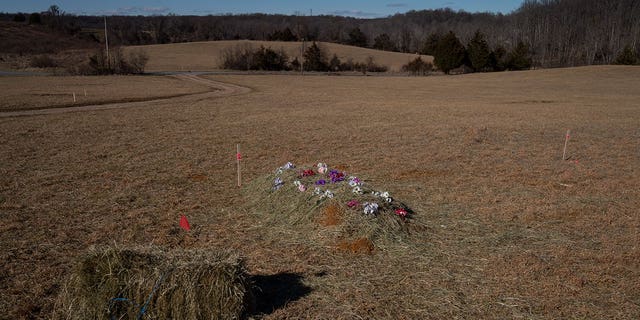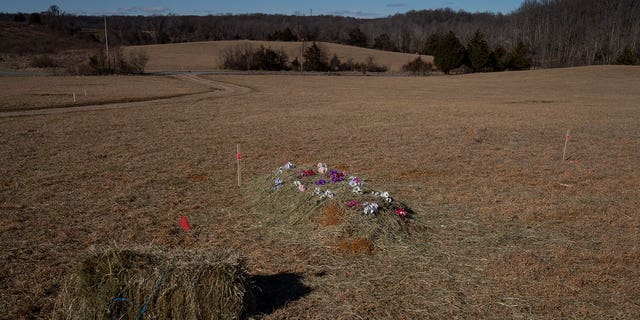
- Eco-conscious alternatives to traditional burials and cremation have been gaining interest across the U.S.
- Efforts to legalize natural organic reduction such as green burials and human composting were previously struck down in the Maryland Senate
- Baltimore City Del. Regina T. Boyce who sponsored a bill requiring environmental studies on funeral practices plans to bring back the legislation next session
As the new president of the National Funeral Directors Association, John O. “Jack” Mitchell IV has been keeping an eye on trends in the industry of death.
The sixth-generation owner of the Mitchell-Wiedefeld Funeral Home in Towson and president of Dulaney Valley Memorial Gardens, Mitchell sees the funeral industry adapting to changing desires for death rites as customers move away from the melancholy of traditional burials.
Many of the changes in funeral services are years in the making, Mitchell said.
BODIES OF MISSING LOTUS DRUMMER, SON RECOVERED FROM ARKANSAS LAKE AFTER DISAPPEARING WHILE KAYAKING
Cremation has been on the rise for decades, surpassing traditional burial in Maryland for the first time in 2020. The coronavirus pandemic massively boosted the already growing practice of livestreaming funeral services. And more women are entering the once male-dominated industry; in fact, more than 78% of mortuary sciences students are female, according to the funeral directors association.
Supply chain issues exacerbated by the pandemic have caused price changes; for example, caskets became more expensive due to a rise in the cost of wood.
Beyond the dominant practices of cremation and burial, Mitchell said families are showing interest in more eco-conscious disposition methods such as “green burials,” which are similar to traditional burials but use biodegradable caskets and do not use chemical embalming.
Another emerging practice is natural organic reduction. Also known as “human composting,” it ultimately turns the body into soil.
The process often involves a solemn “laying in” ceremony, similar to a traditional funeral, where the body is placed into a container along with wood chips, alfalfa and items important to the decedent. After several months, the rich soil created from composted human remains can then be spread out in a more cheerful “laying out” ceremony, allowing the deceased to physically “return to earth.”

The first green burial in Serenity Ridge, an eco-friendly cemetery and nature reserve, is seen in Windsor Mill, Maryland, on Feb. 10, 2023. Alternative burial practices such as green burials and human composting have been gaining more interest across the nation. (Michael Robinson Chávez/The Washington Post via Getty Images)
Natural organic reduction is not legal in Maryland. A bill that would have legalized it died in a Senate committee after passing the House of Delegates. A separate bill requiring state regulators to study the environmental and health impacts of several funeral practices, including natural organic reduction, failed to reach a final vote in the Senate Monday after passing the House.
Baltimore City Del. Regina T. Boyce, who sponsored the bill requiring the environmental analysis, said the study was not to promote a specific practice, but would allow residents to consider their options. She intends to bring the legislation back next session.
The Maryland Catholic Conference lobbied against legalizing the natural organic reduction, noting in testimony that the process was derived from a method of disposing of livestock and saying the decomposition “reduces the human body to a disposable commodity.”
Mitchell noted that the legalization has of natural organic reduction has followed the pattern of states that first legalized cannabis: The process was first legalized in Washington in 2019, followed by Colorado, Oregon, Vermont, California and New York.
“It’s a nod to the ephemeral beauty of life,” said Ben Martin, who officiated one of the first “laying out” ceremonies after natural organic reduction was legalized in Colorado.
WASHINGTON, DC, FUNERAL HOME SOOTING LEAVES 1 DEAD, 3 WOUNDED; GUNMAN AT LARGE
Loved ones were able to participate, grabbing shovels and spreading the soil. Some had the stomach to use their hands, Martin said.
“They definitely found it more cathartic than macabre,” said Martin, who retired from the software industry and became certified as a life-cycle celebrant by the nonprofit Celebrant Foundation, which educates and certifies secular officiants, in 2016.
While Martin is trained to run weddings and other life events, his work in the Denver area mainly focuses on death and the end of life.
Mitchell said that when it comes to services, more families are seeking merrier ceremonies such as celebrations of life, where the focus is on commemorating the story of the deceased.
“People don’t like all the sadness and the tears ― ‘I don’t want people crying over me, celebrate my life, laugh about it’,” Mitchell said.
Funeral homes are adapting — newer establishments leave less space for traditional viewings and funerals, instead offering more party-conducive spaces to accommodate celebrations of life. Mitchell himself is planning the Mitchell Funeral, Cremation and Life Celebration Home, a facility at Dulaney Valley that would offer space for such life celebrations, in 2024.
Some even hold “living funerals” prior to death.
CLICK HERE TO GET THE FOX NEWS APP
“I wish more people knew it was an option,” said Martin, who officiated his cousin’s “living funeral” when she became terminally ill from an inoperable tumor. “It’s an important and beautiful way to go out.”
He described it as an intimate ceremony, full of humor and love, where a group of about 25 friends brought blessings and messages of gratitude to his cousin.
“She was brave for submitting to allow her friends to celebrate her,” Martin said.
Before Martin’s cousin died, she left him with a drafted plan for her “second” funeral, with quotes and music she wanted. After her death, the second event turned out as “really, a beautiful ceremony,” he said.
He reflected that “it’s not cool in our culture” for people to plan for the end of their own life, causing people to be dismissive of the value of pre-planning their funeral and leaving the burden on their families.
While there is increased interest in alternative death rites nationally, Elisa Chase, president of the Celebrant Foundation, speculated that attitudes vary on a regional basis.
She finds families throughout the Eastern Seaboard take a more traditional attitude toward death, while her colleagues further west, like Martin, see more detailed requests for alternative funeral practices.
“If you befriend death, it can make you enjoy your life so much more,” Martin said. “You start to cherish every moment of it.”







